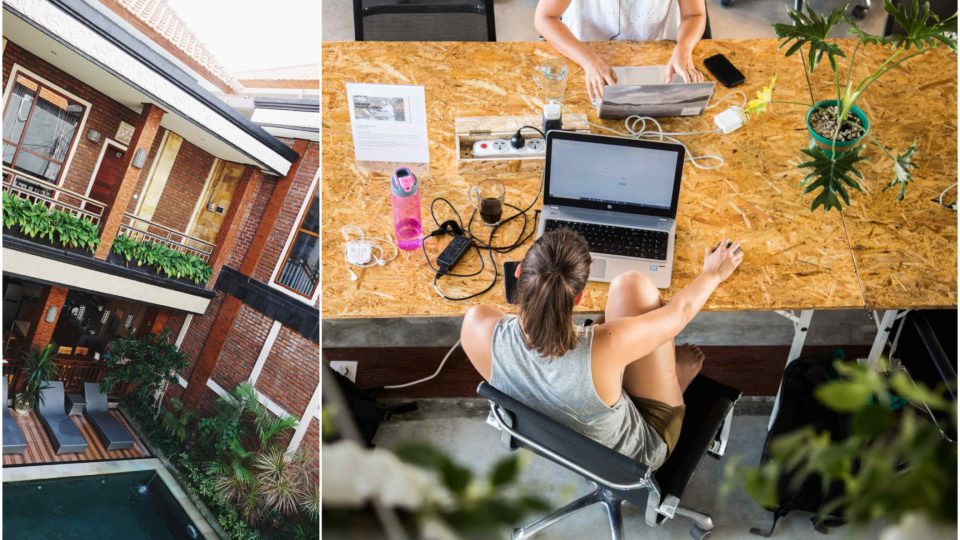Bali is a tropical haven for paradise-seeking, location-independent workers (“digital nomads,” they like to call themselves) — especially in Ubud and Canggu, where most of the island’s coworking spaces are based.
It seems like we can’t go another month without hearing about coworking conferences, coworking space developments (like mergers), or the opening of a new space, promising digital nomads a place to get sh*t done with all the amenities they need: AC and high-speed wifi, namely, plus the chance to tap into a community for remote workers in tech, digital marketing, e-commerce, social media, or whatever else it is these #teaminternet folks do.
Some of these hubs are leveling up to stand out amongst the pack, offering packages that bundle accommodation (which they call “coliving”) with coworking space access for said digital nomads, and people taking “workations” within Bali.
One such space is Outpost, an OG of the Bali coworking scene, which opened up its first location in Ubud in 2015, a second location in Cambodia in 2017, then most recently, set up a space in Canggu’s hip Berawa neighborhood just last year. All three of these locations have coliving options.
Plans are in the works for a fourth location after the brand announced last month that it received a US$1.3 million investment, but the location has not yet been stated publicly.
We’ve been living in Bali under long-term housing for awhile now, so we never had any reason to try out a coliving option on the island — until last month, when Outpost invited us to check theirs out.
Without further ado — here’s a full breakdown of our experience living as a proper digital nomad for a week.
The Neighborhood: Berawa
Outpost’s Canggu location is on Jl. Raya Semat in Berawa, right before the shortcut to Batu Bolong.
The coliving residence is in a separate building from the coworking space and is located in a small road off of Jl. Pantai Berawa. It’s a four-minute scooter ride to Outpost’s Canggu coworking space. You could also get there on foot in about 16 minutes (according to the Google Maps estimation), but because it’s Bali and footpaths are nonexistent — and traffic is no breeze — we recommend going by scooter if you can.
Berawa is a really convenient place to be based if you’re keen for the Canggu experience but prefer a more subdued scene to pumping Batu Bolong and Echo Beach, since you’ve still got beach, restaurants, shopping, and gyms nearby, without as many bars and party-goers.
For the food alone, we love the Berawa area, whether its tacos or vegan food we’re after. We also love all the fitness options around — S2S Crossfit is just next door and Fetch Surf Training Center is just a 10 minute motorbike drive away.
The Coliving Accommodation
Outpost refers to its Canggu coliving as “simple and laidback,” which after staying there for three nights, we found to be quite accurate.
The space is a two-floor brick building centering around a courtyard with a pool, sun loungers (gotta soak up that Bali sun!) and a large, breezy open-air communal kitchen with a dining table and also a bar where you can eat and/or work at. They also have a water dispenser so you can refill your water bottle, which we definitely appreciated, as opposed to most places on the island that just put out single-use plastic bottles in guest rooms.
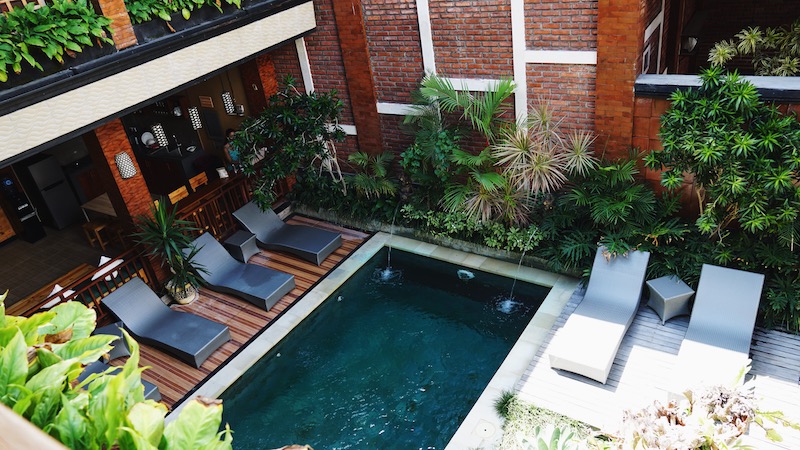
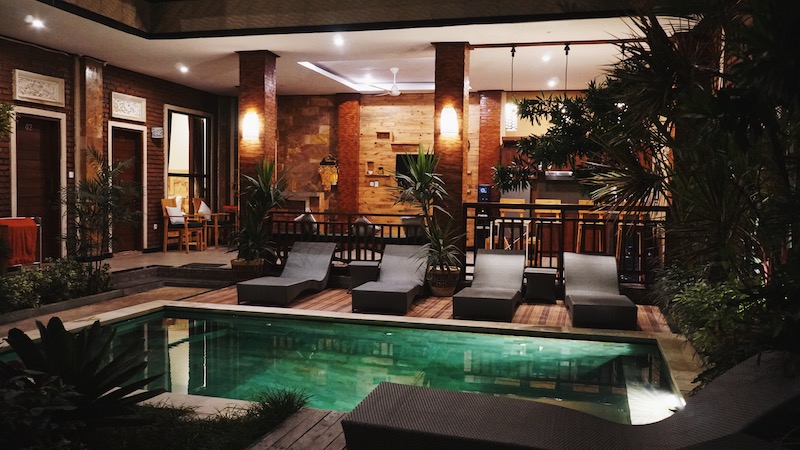
The communal kitchen, which has an airy, open lounge area and bar, makes it conducive to meeting other people staying in the space, since everyone passes through there. Given the whole coliving concept, people who choose to stay there seem to be pretty self-selecting as those looking to meet new people and network.
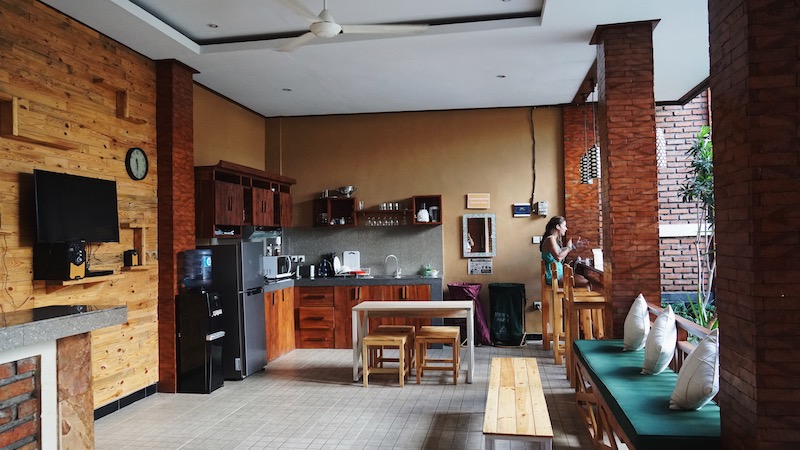
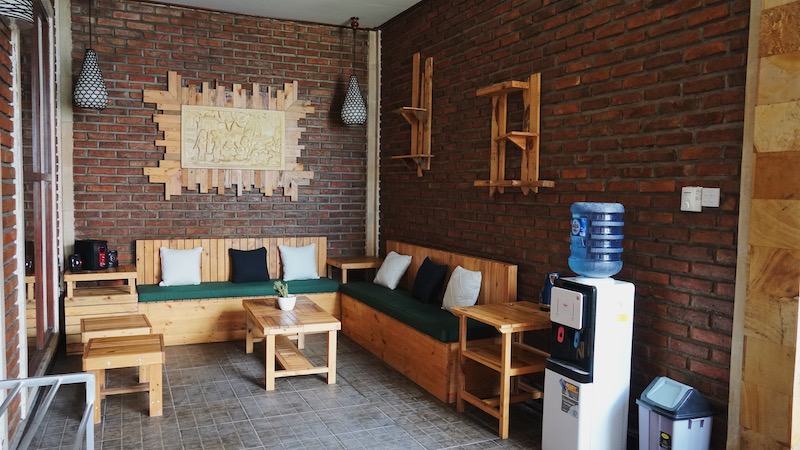
The coliving has seven private rooms, each with an en-suite bathroom, AC, TV, and a desk (which comes in handy for getting work done, of course). All rooms are the same price.
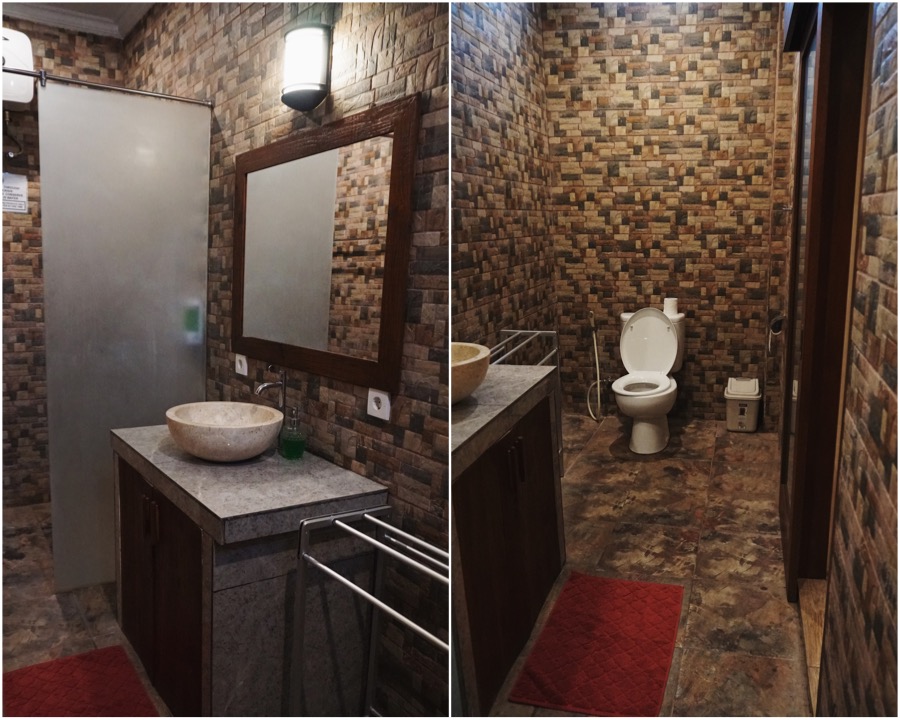
The rooms are big with natural wood furniture and are very thoughtfully equipped with plenty of storage space. The bathroom was also massive and came with shampoo, body wash, and two towels.
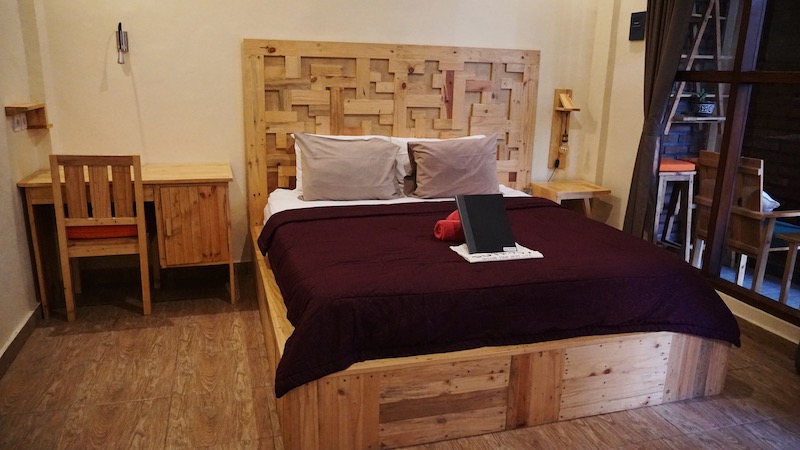
We stayed in room #3 on the first floor by the kitchen. While we found the room super clean and comfortable, we suggest requesting a room on the second floor, if that’s available to you. Because the window of our room was directly facing the kitchen, it’s not very private and anyone sitting in the kitchen (like the receptionist) or at the pool area can see directly into the room if you don’t have your curtains drawn (if you leave them closed during the day, it’s cave-like dark).
Also, either because the lower level gets less air circulation or because the room had been vacant for awhile, our room had a musky smell that’s quite common in a lot of Bali buildings where humid air sits stagnant. Running the AC for a bit helped knock out the smell, but it always seemed to return when the AC was off, which we’d notice whenever we’d come back to the room.
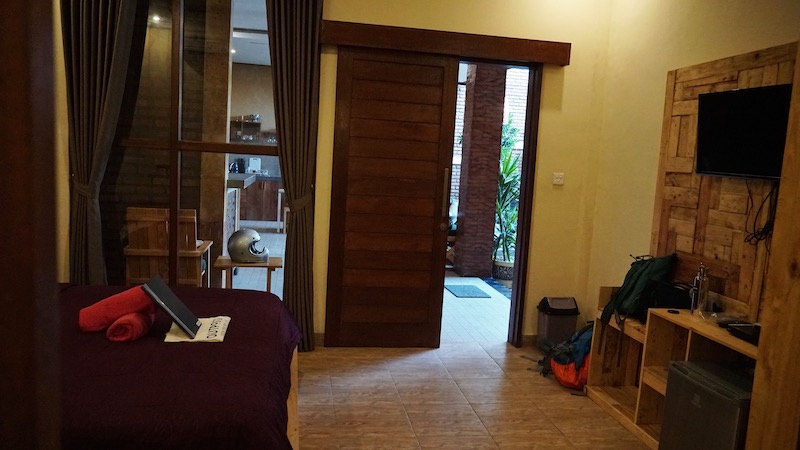
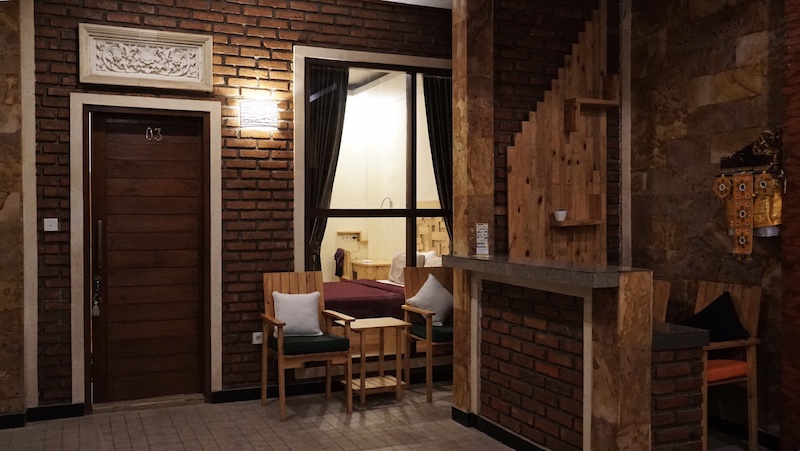
As for actually working from the coliving space, we found a nice work flow for ourselves that involved flitting between the coliving and coworking space — staying at the former for the first half of the day (hey, the food’s there), then to the latter for a change of scenery until dinner time (or a gym sesh first).
The wifi is absolutely fast enough for the average person’s working demands — we were able to watch Game of Thrones, so that should tell you something about the speed.
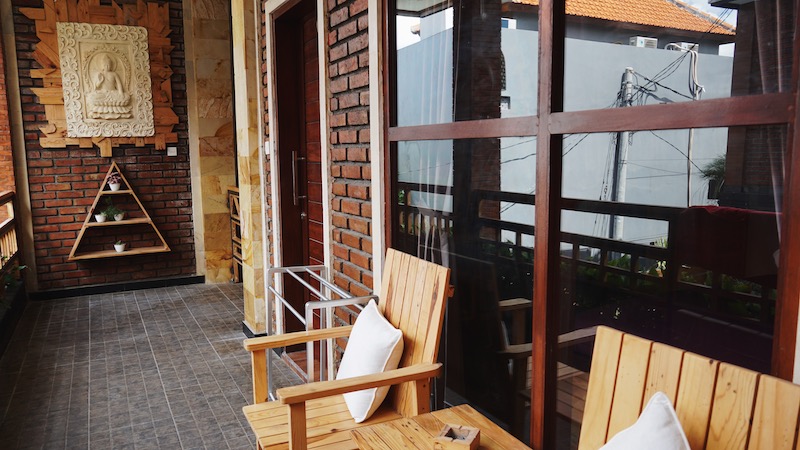
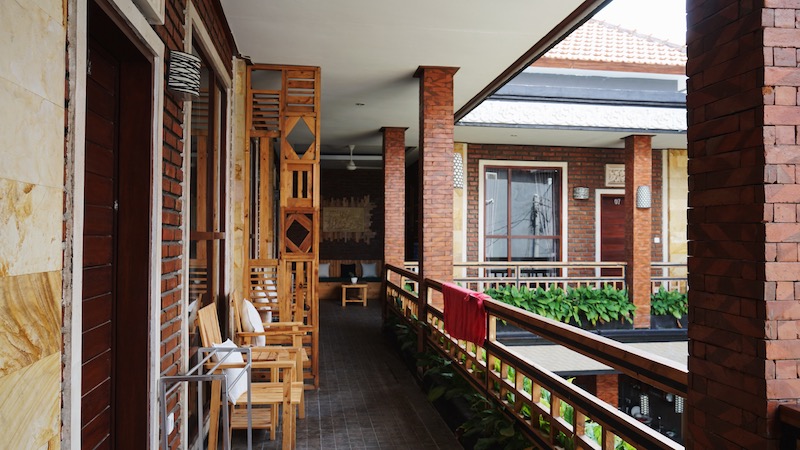
In terms of events for mixing and mingling with the community, Outpost does put on events at the coliving space like movie nights, but the regular events like workshops and lunches at the coworking space are more popular, Outpost staff told us.
The Coworking space
Staying at Outpost’s coliving side means you also get access to the coworking space — which is obviously the draw for most people staying there.
On the first floor is the local cafe chain, Bali Bowls, as well as a pool with loungers so you can squeeze in an afternoon dip during a coffee break. We definitely took advantage of having this cafe just a flight of stairs away and had a couple of meals and coffee there. You can order downstairs and have the cafe staff bring the food up to you, or if you’re really working hard and/or can’t bear to take the 30 seconds to go downstairs, you can go on the Outpost Slack line and have the food delivered up to you.
The actual work part of the coworking space is broken into a few different zones, giving members the choice between fan and AC working spots, as well as talking and quiet areas.
The second floor has a big white, airy vibe, with long glass windows, and a high ceiling with fans generating a soft breeze. Two long tables with office chairs run through the center of the room, which is the “talking area” sans AC.
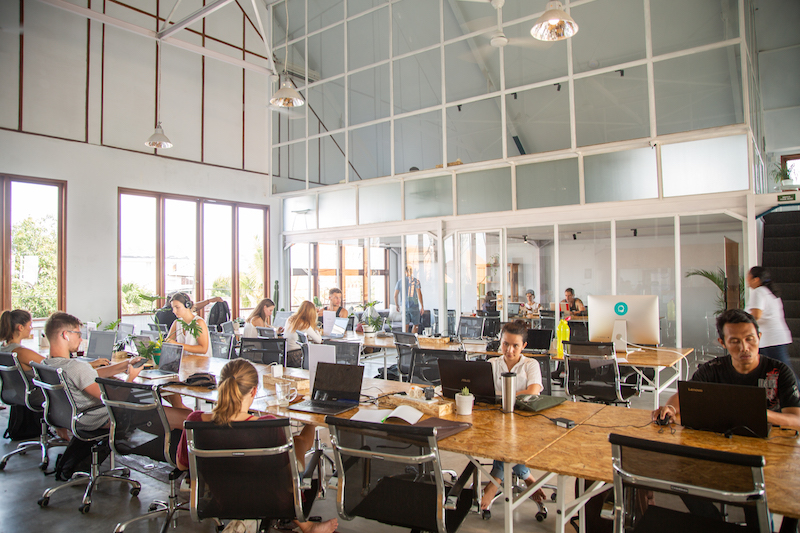
In a smaller room off the side of this center-space, with a full wall of glass windows is the air-conditioned “talking area.” It’s all about your own preferences, but we personally preferred this room because of its more comfortable temperature and the ability to talk if needed.
Lofted above that is the AC quiet zone, which consistently seemed to be the least inhibited space, so if you really need some peace and quiet while working, that’s your spot.
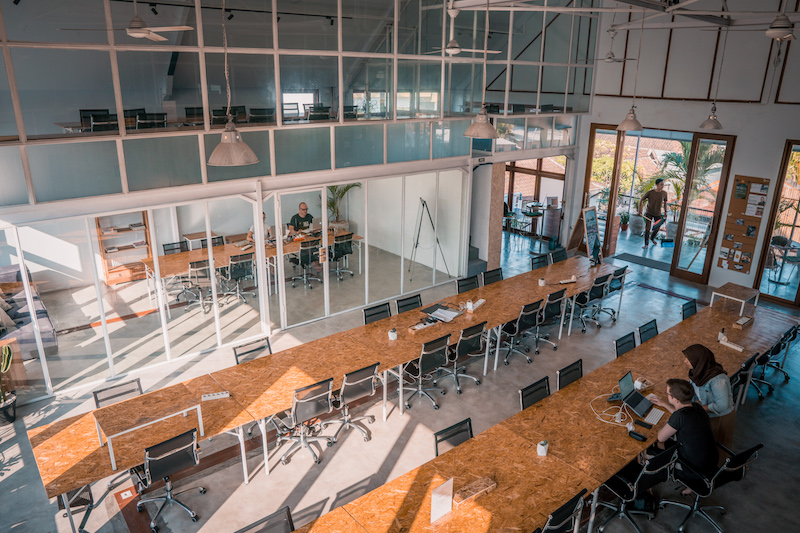
In addition to these spots is a conference room, a loft with bean bag chairs, a terrace overlooking the pool with some tables, couches, and some small booths for Skyping or video conferencing.
Overall, the coworking space has a very modern minimalist yet office-y feel. We found ourselves to be very productive in the space, thanks to all the natural light, climate control, and the whole, being surrounded by other people working thing.
The fast wifi also helped us out. We ran a few speed tests while we were working there and download speeds ran from 19-20 mbps, while upload speeds spanned 12-17 mbps.
The costs — is it worth it?
As of publishing time, the cost of staying at Outpost’s Coliving space is $63 nightly, $315 weekly, $945 for four weeks, or $2,552 for 12 weeks (all prices in USD).
While you can certainly stay in a guesthouse or villa with a similar or even lower price tag in Canggu, we think the access to the coworking space and community that comes with the place makes it worth it — at least, if you’re not planning on being in Bali long-term, or for a launch pad to start out at if you think you’ll be in Bali for awhile but want somewhere to start working and meet people right off.
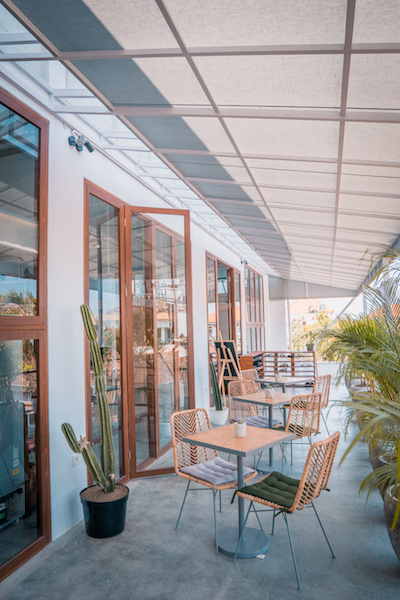
Although the coliving space is best suited for people new to Bali who are here to work and seeking to meet other fellow digital nomads, pretty much instantly, it could also work as a workation destination. Say you live in Sanur, Ubud, or Uluwatu, it’s also a nice option for a mini trip if you want to experience Canggu for a shorter term period of time but still need to spend hustling online.
To assist you with doing your own cost-benefit analysis of whether you should stay at Outpost Coliving, it’s helpful to know how much the coworking costs on its own.
The Lite pass for coworking is IDR680k (US$49) for 25 hours valid for one month; the medium pass is IDR1.625 million (US$115) for 70 hours valid for one month; the “One Pass” is IDR2.7 (US$190) for unlimited monthly access; and the “One Pass Plus” which comes with a dedicated desk is IDR3 million (US$210).
There is also the “Night Owl” pass which can be used from 5pm-8am for IDR1.5 million (US$110) valid for one month; a daily drop-in pass for IDR220k (US$16); 3-month “One Pass” for IDR7.29 million (US$545); and a 3-month “One Pass Unlimited Plus” for DR8.1 million (US$575).
All passes (excluding day passes) bought in Bali can be used at any Outpost Bali location. The “One Pass” includes access to the company’s Cambodia venue.
Side Note: A cool benefit of staying at the coliving space and/or being an Outpost member is that you get discounts to a number of local businesses, mostly restaurants, like The Savage Kitchen, Nüde Cafe, and Matcha Cafe, as well as spa and fitness places, like S2S Crossfit. Like our coupon-cutting mamas, we love a good deal.
FIND IT:
Outpost Canggu Coliving
Gang Layur, Jl. Pantai Berawa
hello@destinationoutpost.co
+62 361 9080584
